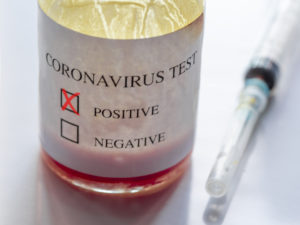
This story has been updated to provide clarification on test kits.
Nursing homes should not use test kits that provide results in just several minutes to detect the presence of the novel coronavirus among residents and staff because of the kits’ likelihood for inaccuracy, the head of a major nursing home lab said during a webinar on Wednesday.
“We don’t recommend facilities use those, because if they’re making decisions about reintroducing patients to the general population … it’s very dangerous to rely on the results of those test kits,” said Christopher Martin, president of American Health Associates and chair of the Diagnostic Testing Committee for the National Association for the Support of Long Term Care (NASL).

He spoke along with Philip Christian, M.D., chief medical officer of American Health Associates, which is based in Miramar, FL, and serves over 300 nursing facilities in the region, during a webinar on COVID-19 testing put on by NASL.
Some kits now available on the market provide tab-based testing materials that rely on blood samples and give results in a half hour or less. Such tests are “cheaper and foreseeably much faster,” Martin said.
The two also expressed their dissatisfaction with a move by some states, such as Florida, to use the National Guard to facilitate rapid testing of COVID-19 in nursing homes. The rapid testing does not have the accuracy or clinical efficacy of other tests, and the presence of the National Guard is highly disruptive to the residents.
“Introducing new people into a facility that hasn’t been there before, frankly, is a very bad idea at scale,” Martin said.
Christian agreed, saying that introducing the National Guard not only has an impact on workflow, but the mental well-being of residents.
“The introduction of new individuals, especially uniformed individuals, can have a mental health impact,” Christian said.
During the presentation, the two spoke about the two different tests used to detect COVID-19: the serum-antibody test, which detects antibodies in the blood that measure the body’s response to the virus; and the polymerase chain reaction (PCR) test, which detects the virus specifically. The tests actually complement each other, Christian said. For nursing home residents who are symptomatic, a facility ideally should order both tests to not only detect the virus but also provide a timeline of when the person may have been exposed to the virus. For those who are asymptomatic, using the antibody test makes the most sense, Christian said.
During this crisis, the Food and Drug Administration has received emergency use authorization to fast-track various tests on the market. Christian cautioned against new, unproven tests, however, as they are not as reliable as gold standard PCR test, which takes about an hour to an hour and a half to analyze the virus.
American Health Associates has chosen “the highest-caliber, most precise instrumentation on the market to make sure we are not using unproven analyzers with a new unproven test on a new virus,” Christian said.
The protocol for COVID-19 testing at a nursing home begins with a doctor who orders the tests. A lab phlebotomist then comes to the facility and takes blood in the case of the serum-antibody test. For the PCR test, the lab drops off the nasopharyngeal swabs and later picks up the specimens, Martin explained.





